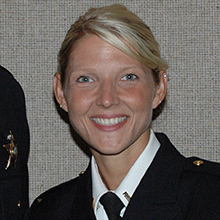
I got accepted into the Naval Postgraduate School to pursue a second Master’s Degree in Homeland Security and Defense in June of this year. I decided to move outside of my comfort zone in quest of this degree because I feel as though state and local government needs to be more in sync with the Federal initiatives that involve keeping our homeland secure. When agents interrupted two Aurora natives just prior to their joining ISIS earlier in the year, I started to pay attention to ways our local police might be able to assist in the Homeland Security Enterprise. In short, I need to learn more about what I don’t know.
I’m only months into the Department of Homeland Security program and my mind has already been expanded beyond it’s original proportions. When I met my classmates during our first “in-residence” stay at the Naval base, I was certain that the officials would realize their mistake by allowing me into the program so I didn’t fully unpack {smile}. My classmates represent a facet of Federal entities and are experts in things like: all-source intelligence operations, Foreign Intelligence Services, border protection, emergency management, technology in Homeland Security (to name a few).
In other words, they are really smart people with really high security clearances.
I quickly regained confidence as it became more and more clear to me that local police agencies have a great deal of resources and intelligence that can serve as a force-multiplier when it comes to protecting our city. It didn’t take long to understand that this “enterprise” works when all the players come together to share information.
My first research paper was due yesterday and I decided to write about the current plight of policing and the trust that has been eroded as a result of high profile incidents in our nation. I turned my focus on “soft power” in contrast to “hard power” and set out to explore how the former is not “soft” at all and how we can build better police officers by instilling empathy, compassion and respect as the foundation of training. Skills like defensive tactics, firearms proficiency and arrest techniques are crucial but employing the former during the initial interaction might actually keep officers from having to resort to the latter.
I was pretty proud of the final 16 page product. That is, until I received feedback from my professor. He turned my words into a sea of digital red ink and the common theme in his criticism was my lack of evidence to back up my claims. I began my paper with the following sentence: “The public has lost trust in the police.” It’s a pretty bold declaration and the red font inserted by my professor was:
“Who are you and why should we believe you? Where is the evidence to back up this statement”?
I was thinking, “I’m Kristen Ziman and I’m a cop and I know this because I feel it.”
As it turns out, I am not a reputable source. Mind blown!
I should know better. After all, I’ve been a police officer for 21 years and I have tons of experience writing police reports and from our first day in the academy, we are taught that the foundation of report-writing is to report only the facts.
There is no tolerance for rumor, conjecture, opinion any other descriptive word that isn’t based on fact.
I’ve been a columnist for the “Beacon News” since the mid-2000’s and in my columns, it’s pretty common knowledge that I offer my editorial – my opine. My writing is based on my knowledge and experience but it is merely my personal thoughts on police-related matters through my lens.
I like writing in that style because it’s important to me that people know where I stand on most topics and it offers an opportunity for respectful discourse. I adore it when a reader disagrees and shows me a different perspective that I might not have considered.
There’s a time and a place for editorials. However, in order to achieve a degree in Department of Homeland Security, it’s time to get back to basics of research and report only the facts.
Now I just need to stop retorting to people during conversations, “Who are you and why should I believe you?”
Without fact or supportive evidence, there is only opinion — and that’s pretty much the same as fiction.
This post was originally published on October 6, 2015 on Commander Ziman’s blog.